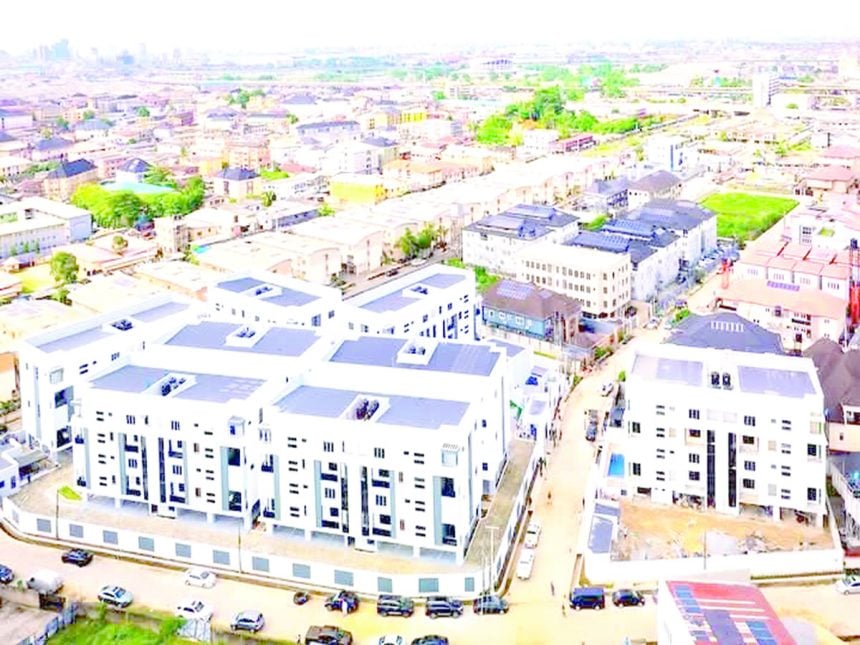Housing industry experts have raised fresh concerns over the astronomical costs of building materials, making housing unaffordable for the average Nigerians.
They warned that if the trend continues, it would worsen housing crisis among accommodation-seeking Nigerians.
The professionals pointed out that many Nigerians are finding it difficult with high rental payments, while those planning to build their own home have abandoned the dream due to building materials’ high costs.
A quick survey of the building materials market in Lagos by the Nigerian Tribune shows that reinforcement bar costs between N920,000 and N1.34million per ton; 50kg cement bag – N9, 500 to N10,200; sharp sand – N85,000 to N150,000 per tipper; granite – N540,000 to N660,000 per truckload; roofing sheet – N4,500 to 51, 000 per meter, depending on type, size and diameter.
Although the Federal Government, through its Renewed Hope Cities and Estates initiative nationwide, is aimed at providing decent and affordable housing for Nigerians, with some units already completed, the built environment experts said that the cost of these houses is beyond the reach of Nigerian workers earning the minimum wage of between N70,000 monthly.
Housing deficit in Nigeria stands at 22 million units, according to the United Nations’ estimate, while many Nigerians in urban centres live in slums.
The Managing Director, Fame Oyster and Co., Mr. Femi Oyedele, said that the houses being built by the government under the Renewed Hope Agenda are still not affordable to workers.
“The minimum price for one-bedroom apartments in the government-funded Renewed Hope Estates is between N8 million and N9 million.
“Houses developed under the Renewed Hope Cities Public-Private Partnership (PPP) model, such as the Renewed Hope Cities in Abuja, are priced higher, with one-bedroom flat starting around N22 million to N25 million,” he said
The aforementioned prices, Oyedele said, were still lower than the average for the private developed estates at minimum of N22 million and average of N65 million.
“The lower prices for the government estates are due to government funding and subsidies, which are not present in the private developed estates around the country,” he said.
On the issue of mortgage, Oyedele said there have been in place operational mortgage facilities that would allow Nigerians to access to build or buy their houses presently.
He said: “MOFI Real Estate Investment Fund (MREIF) is designed to make owning your home a reality, offering affordable mortgages of up to 20 years at a fixed interest rate of just 9.75% per annum.
“These mortgages are being created through primary mortgage institutions (PMIs) with some PMIs claiming to have created over 100 mortgages.
“We must commend this administration for trying to hold the bull by its horns to solve the housing challenges in Nigeria which experts put at between 22 million to 28 million housing units deficit among other challenges.”
Corroborating Oyedele, former president, Nigerian Institute of Town Planners, Nathaniel Atebije, said that many Nigerian workers would not be able to afford the government housing scheme due to high prices
He said: “We have discussed at various fora how we can make housing more affordable and more accessible to many of the people, especially the low-income group.
“In fact, there is nobody, low and middle income groups in Nigeria today that can actually afford building a house that is comfortable for himself.
“ Some of the things that we advocated are that by policy, government can give land at concessionary cost to the private developer. Cost of land is a great ingredient in the cost of the houses.”
Vice Chairman, Association of Professional Bodies of Nigeria, Delta State Chapter, Timi Afolabi, described the cost of housing units in government’s estates as “outrageous” for the average Nigerian workers, who, according to him, received monthly minimum wage of N70,000, gross of taxes.
He also pointed out that assessing loan through the mortgage banking system has become a Herculean task, adding that at two two-digit interest rate, borrower would have to pay through his or her lifetime including his or her retirement benefits.
According to him, those who are trying to use their pension funds to get mortgage facilities from Primary Mortgage Institutions PMI are not finding it easy.
He said:”At N8 million to N9 million for Renewed Hope Estate and N22 million Renewed Hope Cities for one bedroom is too outrageous for average Nigerian worker who minimum wage is N70,000, gross of taxes .
“How much will an average worker saved from his or her income in order to acquire one bedroom unit of Renewed Hope houses at such humongous amount of money? He or she will have to resort to borrowing or indulge in sharp practices in order to acquire the property.”
The Delta State ‘s APBN vice chairman said that his thought before now was that the government would have studied the Lateef Jakande’s model that made housing a plaything for Lagosians .
“Jakande was masses-focused whilst the current Federal and Lagos State Governments are elitist in their housing solutions,” he said
He suggested that every effort should be made to open up new areas with infrastructure, and ensure that cost of local construction materials from quarry is reduced.
According to him, efforts should be made to get the moribund steel companies in Aladja – Delta State and Ajaokuta – Kogi State back in full swing to produce steel needed for construction industry.
“Dependence on importation of construction materials will never help the economy.
“Dangote and BUA , among others, should do all within their powers to cut down on cement cost,” Afolabi said.
Naturally, former President, Nigerian Institute of Building, Mr. Kunle Awobodu, said that inflation has not helped the matter, explaining that when prices of building materials become inflated, it would impact negatively on the sales of the building or the rentage.
“The target of every businessman or woman that invests in building for commercial purposes will be on profit in order to recoup the investments and also carry out further investment or to multiply investment.
“So, as a result of this, it becomes so difficult to regulate the rental prices by the government. Midway, if care is not taken in the industry, the implementation of budget has become more expensive than the anticipated prices. This will lead to compromise of quality and standard construction,” he said.
READ ALSO: Experts suggest solutions to Nigeria’s worsening housing crisis
WATCH TOP VIDEOS FROM NIGERIAN TRIBUNE TV
- Let’s Talk About SELF-AWARENESS
- Is Your Confidence Mistaken for Pride? Let’s talk about it
- Is Etiquette About Perfection…Or Just Not Being Rude?
- Top Psychologist Reveal 3 Signs You’re Struggling With Imposter Syndrome
- Do You Pick Up Work-Related Calls at Midnight or Never? Let’s Talk About Boundaries






